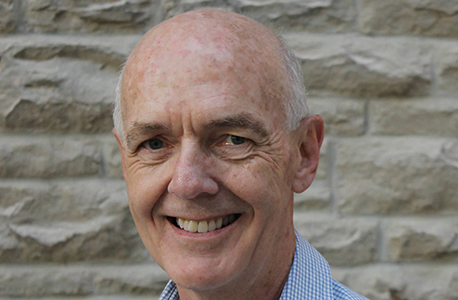Intro
Adding to his long list of awards, Distinguished University Professor Emeritus David Sherry (pictured below) of Western University in London, Ontario, Canada, was awarded the Comparative Cognition Society 2021 Research Award. Recipients of the award give a master lecture at the International Conference on Comparative Cognition and a Special Issue in the Psychonomic Society’s journal, Learning & Behavior, is dedicated to research directly influenced by the awardee’s research. I get the pleasure of interviewing David. Below is the interview where David answers questions about his career, research, and beyond.

Interview with Professor Sherry
Mickes: Congratulations on receiving the Comparative Cognition Society 2021 Research Award, David. I’m delighted that you agreed to be interviewed. I’m sure I’m not the only one who will benefit from learning more about you and your highly influential career.
The majority of us won’t ever have a Special Issue based entirely on the product of our work. How did it feel when you heard about the award? Please, let us live vicariously through you.
Sherry: It was a wonderful surprise.
Mickes: I can only imagine.
The Special Issue features 17 papers describing research inspired by your research. And based on those papers, it’s clear that your influence is wide-reaching. The common thread of the articles is memory and the hippocampus in a range of species. The research features many different birds (hummingbirds, tits, zebra finches, etc.), insects (ants), and, what struck me as incredible, in Echinodermata, a type of invertebrate, like a starfish. Expanding on your approach to understanding how brain-less animals learn was unexpected and fascinating. All of the articles look like they’ll be worthwhile reads, and I’m especially looking forward to reading about the “neuroecology beyond the brain.”
It may not be what people in the field recognize as the most important; which of your contributions are most important to you?
Sherry: A few things that now seem pretty straightforward: showing that food-storing birds remember where they put their caches, and finding that the avian hippocampus is involved in memory of this kind.
Mickes: It does seem straightforward now. But almost certainly it wasn’t the case when you were in the trenches. I reckon it’s only straightforward now because of all of the research showing this is the case.
You co-authored a paper in the Special Issue called, “Interaction of memory systems is controlled by context in both food-storing and non-storing birds.” Will you tell us the take-home message of that paper?
Sherry: That was a collaboration with Emily Brown, Caroline Strang, and Robert Hampton. All the good ideas in that paper are really theirs. We found that birds can remember spatial locations as either the location that is usually correct – a kind of habit memory – or as the location that was correct most recently. The birds can switch back and forth between these two sources of remembered information and use context as a cue to which one to use. The spatial locations were locations a touch screen and the contexts were background images displayed on the screen. This result indicates that the birds can use these two different memory systems quite flexibly and decide which one is appropriate to the context.
Mickes: How interesting that there is that flexibility in the system. I look forward to reading the paper. Irene Pepperberg, last year’s recipient of the Comparative Cognition Society Research Award, is working on bird cognition also has the subjects using touch screens in her current research.
Reading your CV is humbling. Your funding history is awe-inspiring. It looks as though you were funded continuously from 1980 until 2024. Funding is critical, given that working with animals is pricey. You currently have an NSERC Discovery Grant. What research are you conducting with that funding?
Sherry: That grant is supporting a collaborative project with Diano Marrone and Adriana Diez Mendieta on the maturation of new neurons in the avian hippocampus and work by PhD student Maddie Brodbeck on Cluster N, a magnetic field sensitive region of the avian brain. It also supported the recently completed PhD work of Jeff Martin on food caching decisions of Canada jays, and of Chris Course who used radiotags to track social behaviour in winter flocks of black-capped chickadees.
Mickes: It covers a lot of ground.
I interviewed one of the Guest Editors of your Special Issue, Scott MacDougall-Shackleton, and asked him several questions about you and your research. One question was, “What should I ask David?” Here’s his question for you:
How has your legacy influenced other evolutionary approaches to behavior?
Sherry: I really couldn’t say. I think what I have done, mainly, is to show that comparative and evolutionary approaches can be applied to animal cognition and the brain. Many other people have done this, too, and some long before me, but I suppose what I provided are some new instances of what can be discovered using this approach.
Mickes: When I spoke with Scott, he mentioned that your background in theater influenced how you communicate while teaching and giving talks. He described it as a highly effective means of communicating. Do you credit your theater background? Do you think acting classes would benefit other academics? Or is your communication style natural to you?
Sherry: Whether it’s Tennessee Williams or Tom Stoppard, theatre audiences expect something larger than life and that doesn’t really lend itself to giving a talk. You do get used to the idea, though, that the people in the audience have committed to sitting there and listening to you, so you want to give them something interesting and engaging.
Mickes: I suppose it would be over the top, but I’d love to hear Liza Minnelli give aresearch talk. Staying with the theater a bit, do you ever wish you continued with acting? It’s beneficial for the field (the one you created!) that you took the path you did, but if you didn’t, what would you have done instead of science?
Sherry: Honestly, I have no idea. I do know that the path I took involved a lot of chance events: chance meetings with people; opportunities that, by chance, came along when I was able to pursue them.
Mickes: Getting back to your career, what are some of the biggest challenges or obstacles you encountered? Can you tell others who may come across the same challenges and obstacles how to overcome them?
Sherry: I think I have been very lucky. Western University has been very supportive over the years and I have had many outstanding colleagues and students. The challenges have mostly been minor ones that could be overcome with patience and imagination
Mickes: I think you have been lucky, indeed. What is your favorite part of your career? What gave you the most enjoyment?
Sherry: Watching animals. Watching chickadees store food, seeing a female cowbird get chased out of a shrub by an irate cardinal, watching thousands of sandpipers swoop over the mudflats in the Bay of Fundy.

Mickes: If you were to go back in time, what kind of advice would you give the David Sherry who just graduated from college?
Sherry: I am not sure, I often feel that I backed into an academic career without much planning. I suppose my advice would be to do what you are most interested in doing, whatever it is that you really want to do.
Mickes: That’s a great piece of advice.
In your long career, have you noticed any major changes, for better or worse, across the years in how our “business” is run?
Sherry: There are many more sources of funding than there were when I started out, especially for large multi-group collaborations. And graduate students are much better prepared, in terms of career development, than they used to be. Graduate programs used to do little more than say, here is your degree, good luck. Many graduate programs now include specific instruction on writing grants, writing papers, and preparing for academic and non-academic careers.
Mickes: I hope better preparing graduate students is universal now.
In your research, you studied a variety of birds, rodents, and bees. Here’s a light-hearted question, do you have a least favorite species to research? Do you have a favorite species to research?
Sherry: Not really a least favourite. I would say my favourites are the familiar birds of southern Ontario. I grew up on the Niagara escarpment in an area of meadows, old field habitat, abandoned orchards, and woodlots. It is the birds and insects of that environment that I have always been drawn to. I wasn’t a precocious naturalist, far from it. I didn’t start birding seriously until I was a graduate student at Toronto and took Jon Barlow’s ornithology course at the Royal Ontario Museum. The course consisted mainly of identifying specimens in the museum collection to the family level. The tests were things like reaching into a cloth bag and identifying a specimen by touch alone. It sounds impossible, unless you remembered that herons, egrets, and bitterns (family Ardeidae) have a comb on one of the toes. Then it’s easy.

Mickes: I mainly study memory using human participants. What would you tell me and others who only use human participants in our investigations about that? Are we missing something?
Sherry: The big difference between investigating animal and human cognition is that we can give human participants instructions about a task and ask them questions afterwards. With animals we don’t have this channel of communication. The best we can do is design a task and the animals will do whatever they want. There is no guarantee that the animals are attending to what the experimenter thinks is the important feature of the task. Birds can, for example, solve some seemingly complex problems by simple means. I am usually skeptical of claims that birds have understood a complex task in the way that the experimenter intended. Understanding is a claim about the bird’s mental state and we don’t have access to that. Birds can certainly do astounding things, like long distance migration, no doubt using cognitive processes that remain to be discovered. Maybe they possess understanding, maybe they don’t, but I see no way, in principle, to adjudicate that question. I think researchers working with humans have an advantage there because they can communicate with their participants.
Mickes: I will consider myself lucky then! Thank you so much for your candid responses.
If readers are interested in learning more about David’s career, research, and the Learning & Behavior Special Issue in honor of his body of work, please check out my interview with David’s collaborator and one of the Guest Editors of the Special Issue, Scott MacDougall-Shackleton.
